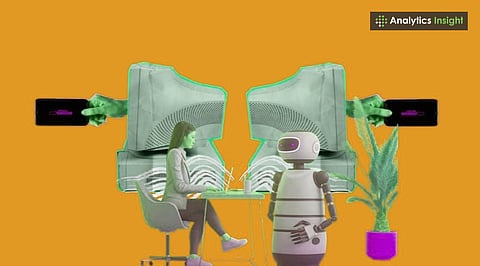

AI agents are classified into various types, including simple reflex, model-based, goal-based, utility-based, and learning agents.
Each type of AI agent varies in complexity, decision-making, and adaptability.
Learning and utility-based agents represent the most advanced levels of AI intelligence.
Artificial Intelligence is now super crucial in tech. You see it in everything from talking helpers on your phone to cars that drive themselves. At the center of all this are AI helpers - basically, computer systems designed to monitor their surroundings, make decisions, and then execute them.
Many beginners first ask, What are the Types of AI Agents, to understand their roles. To understand how machines operate and adapt when things change, it helps to know the different types of AI agents.
An AI agent is simply a program or system that observes its surroundings, analyzes the information, and then takes action to achieve a specific goal. This helper does three things in a row: watches, thinks, and acts.
Researchers categorize types of AI Agents based on their capabilities and goals. Think about Siri. It hears you, understands what you say, and answers you correctly. Not all AI agents are made equal. Some are smarter, can learn more, and are better at solving problems than others.
Also Read: iPhone 17 Series to Get OpenAI's GPT-5 Model for Enhanced Siri
Understanding different AI Agents Types helps in building effective applications. AI agents come in all sorts, depending on how they operate. Let's examine the primary types.
Real-world AI Agents Examples include chatbots, recommendation systems, and game bots. AI agents are not that bright. They simply do as they're told in the present and don't recall anything.
Example: Like a heater that turns on when the temperature drops.
Best part: These only do well when things don't change much.
These aren't your average ones. They keep track of tasks and utilize a concept known as a world model to make more informed choices. This model helps them remember what happened before and guess what might happen next. Think of it like a chatbot that actually remembers what you talked about last time.
Best part: They have a memory and make better choices.
Developers can explore AI Agents Open Source projects to experiment and learn. These helpers don't just react. They have a target in mind. They plan and select options that move them closer to their goal. It's like a GPS finding the quickest route.
Best part: They focus on targets, not just reacting.
These helpers aren't just about hitting goals. They care about the outcome and go for the move that yields the best rewards. They try to pick the very best choice when they have a lot of options.
Example: Shopping sites that tell you what to buy based on what you usually like.
Best part: They offer a range of options to make you the happiest.
These are the smartest ones. They adapt their methods and become more informed with additional information.
Example: A self-driving car that improves with each driving experience.
Best part: They can grow and change.
Also Read: Meta Launches AI Chatbot in WhatsApp: Violates EU Competition Rules
Each kind of AI helper works best in different spots. Simple ones are good for easy tasks, but learning ones are needed for places where things are always changing. Companies select the correct type of AI agent based on their specific needs.
Factories might have simple helpers for work that's repetitive and consistent. Customer service might have helpers who remember stuff or have targets.
AI's improving quickly, so these tools are getting better at what they do. Soon, computer systems may integrate various types of Artificial Intelligence, creating tools that combine distinct abilities.
These helpers won't just react; they will also plan. They'll also continue learning, which will enable them to excel at solving real-world problems.
AI helpers are what make smart systems work. Artificial Intelligence has gotten way better. It's not just doing simple tasks anymore; it's learning! Artificial Intelligence is proficient in a wide range of functions. As technology improves, these helpers are only going to get better. You'll be able to trust them more, they'll learn faster, and they'll show up in all sorts of daily tasks.
1. What is an AI agent?
An AI agent is a system that senses, decides, and acts to achieve a goal.
2. How many main types of AI agents are there?
There are five main types: simple reflex, model-based, goal-based, utility-based, and learning agents.
3. Which AI agent is the simplest?
The simple reflex agent is the most basic, acting only on current conditions.
4. Which AI agent can learn and improve over time?
Learning agents adapt by gaining knowledge from past experiences.
5. Why are different types of AI agents needed?
Different agents suit different tasks, from simple controls to complex problem-solving.
